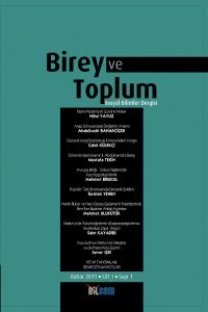İlk Dönem Amerikalıların İslam Algısı
Amerika, Müslümanlar, Türkler, Hıristiyanlık, oryantalizm, kimlik, algı, kalıp yargı.
___
- Allison, Robert J. 1995. The Crescent Obscured: The United States and the Muslim
- World 1776-1815. New York and Oxford: Oxford University Press.
- Austin, Allan D. 1986. African Muslims in Antebellum America: A Source Book.
- New York and London: Gerald Publishing, Inc.
- Baepler, Paul. 1999. White Slaves, African Masters: An Anthology of American
- Barbary Captivity Narratives. Chicago: University of Chicago Press.
- Cantor, Milton. “A Connecticut Yankee in a Barbary Court: Joel Barlow's Algerian
- Letters to His Wife,” The William and Mary Quarterly, 3rd Ser., Vol. 19, No. 1
- (Jan., 1962), pp. 86-109
- Fisher, Godfrey. 1957. Barbary Legend: War, Trade and Piracy in North Africa,
- -1830. Oxford: Clarendon Press
- Friedman, Ellen. “The Exercise of Religion by Spanish Captives in North Africa”,
- Sixteenth Century Journal, Vol. 6, No. 1 (Apr., 1975), p. 21
- Hammurabi's Code of Laws, Translated by L. W. King, Retrieved May 5, 2007 from:
- http://eawc.evansville.edu/anthology/hammurabi.htm
- Jefferson. Thomas, Autobiography (the Avalon Project at Yale Law School), retrieved
- April 15, 2007 from: http://www.yale.edu/lawweb/avalon/jeffauto.htm.
- Jefferson, Thomas. Eighth Annual Message to Congress. November 8, 1808 http://
- www.yale.edu/lawweb/avalon/presiden/sou/jeffmes8.htm. (The Avalon Project)
- Retrieved April 11, 2007
- Kidd, Thomas S. “Is It Worse to Follow Mahomet than the Devil?: Early American
- Uses of Islam”, Church History. 72, no. 4, (2003) p.766-790
- Markoe, Peter. 1787. The Algerian Spy in Pennsylvania or Letters written by a Native
- of Algiers on the Affairs of the United States in America from the Close of the Year
- to the Meeting of the Convention. Philadelphia: Richard and Hall
- Marr, Timothy. 2006. The Cultural Roots of American Islamicism. Cambridge:
- Cambridge University Press.
- Matar, Nabil. 2002. In the Lands of the Christians: Arab Travel Writing in the 17th
- Century. New York. Routledge
- McAlister, Melani. 2001. Epic Encounters: Culture, Media, and U.S. Interests in the
- Middle East, 1945-2000. Berkeley: University of California Press.
- McAlister, Melani, “Saving Private Lynch”, New York Times, April 6, 2003
- Myles, Anne G. “Slaves in Algiers, Captives in Iraq: The strange career of the
- Barbary captivity narrative”, from: http://www.common-place.org/vol-05/no-01/
- myles/index.shtml. vol. 5 · no. 1 · October 2004, retrieved May 5, 2007
- Norton, Marry B. 1980. Liberty's Daughters: the Revolutionary Experience of
- American Women, 1750-1800. United States: Harper Collins Publishers.
- Parker, Richard B. 2004. Uncle Sam in Barbary: A Diplomatic History. Gainesville:
- University Press of Florida.
- Radosh, Ronald. “American foreign policy at home in the Middle East”. The Weekly
- Standard, 02/05/2007, Volume 012, Issue 20
- Rowson, Susanna H. 1794. Slaves in Algiers; or, a struggle for freedom: a play,
- interspersed with songs, in three acts. Philadelphia: Wrigley and Berriman, prtrs.,
- Said, Edward W. 1979. Orientalism, New York: Vantage.
- Shaler, William. 1826. Sketches of Algiers, Political, Historical, and Civil; Containing
- an Account of the Geography, Population, Government, Revenues, Commerce,
- Agriculture, Arts, Civil Institutions, Tribes, Manners, Languages, and Recent Political
- History of that Country. Boston: Cummings, Hilliard and Company.
- Shaler, William. On the Language, Manners, and Customs of the Berbers, or
- Berbers, of Africa. Communicated by William Shaler, Consul of the United States
- at Algiers, in a Series of Letters to Peter S. Du Ponceau, and by the Latter to the
- Society Transactions of the American Philosophical Society New Ser., Vol. 2 (1825),
- pp. 438-465
- Treaty of Peace and Amity, Signed at Algiers September 5, 1795, Article 16 (the
- Avalon Project) http://www.yale.edu/lawweb/avalon/diplomacy/barbary/bar1795t.
- htm. re112trieved April 12, 2007.
- Wheelan, Joseph. 2003. Jefferson's War: America's First War on Terror. Carroll &
- Graf Publishers.
- Washington, George. Eighth Annual Message of George Washington United States,
- http://www.yale.edu/lawweb/avalon/presiden/sou/washs08.htm December 7, 1796
- (The Avalon Project)
- Washington, George. Seventh Annual Message of George Washington United States,
- http://www.yale.edu/lawweb/avalon/presiden/sou/washs07.htm (The Avalon Project)
- December 8, 1795
- ISSN: 2146-4634
- Yayın Aralığı: Yılda 2 Sayı
- Başlangıç: 2011
- Yayıncı: Bilgi Yolu Eğitim Kültür ve Sosyal Araştırmalar Merkezi: BİLSAM
Abdurrezzak Kâşanî (ö.730/13309)'nin Hayatı, İlmî-Tasavvufî Kişiliği ve Eserleri
Hz. İbrahim'e Anakronik Bakış ya da Dinsel Şiddetin Kolonyal İnşası
İlk Dönem Amerikalıların İslam Algısı
Necip Fazıl Kısakürek'in “Ben” Şiirinin Ontolojik Tahlil Yöntemi ile Çözümlenmesi
Eşit/sizliğin Tarafı Olmak: Mardin'de Toplumsal Cinsiyet Algısı
Abdurrezzak Kâşanî (ö.730/13309)'nin Hayatı, İlmî-Tasavvufî Kişiliği ve Eserleri
Kimlik ve Çokkültürcülük Sosyolojisi
